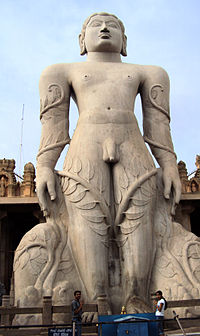Renunciation (or renouncing) is the act of rejecting something, particularly something that the renunciant has previously enjoyed or endorsed.

In religion, renunciation often indicates an abandonment of pursuit of material comforts, in the interests of achieving Enlightenment, Liberation, or Kevala Jnana, for example as practiced in Buddhism, Hinduism, and Jainism respectively. In Hinduism, the renounced order of life is sannyāsa; in Buddhism, the Pali word for "renunciation" is nekkhamma, conveying more specifically "giving up the world and leading a holy life" or "freedom from lust, craving and desires".[1] (See also sangha, bhikkhu, bhikkhuni, and śramaṇa.) In Christianity, some denominations have a tradition of renunciation of the Devil.
Renunciation of citizenship is the formal process by which a person voluntarily relinquishes the status of citizen of a specific country. A person can also renounce property, as when a person submits a disclaimer of interest in property that has been left to them in a will.
Buddhism
The lives of Gautama Buddha illustrate the point as they demonstrated extreme renunciation and detachment in the performance of their Karma. Gautama Buddha renounced a kingdom in the quest for truth.
Hinduism
Renunciation in Hinduism is primarily associated with the Sanskrit terms saṃnyāsa and saṃnyāsin. Saṃnyāsa denotes the practice of renouncing worldly life to become a homeless wandering mendicant, while saṃnyāsin refers to an individual who adopts this lifestyle. These terms became prominent around the beginning of the Common Era and were widely used in the medieval period. Ancient texts such as the Dharmaśāstra more commonly used terms like pravrajita, parivrajaka, parivrat, bhiksu, śramaṇa, and yati for ascetics.[2]
The lives of Rama and Krishna illustrate the point as they demonstrated extreme renunciation and detachment in the performance of their karma. Rama renounced the throne of Ayodhya in obedience to his father. Krishna charioted and directed the Mahabharata in the Kurukshetra war, but did not aspire for anything for himself.
Jainism
Christianity
In some Christian denominations, renunciation of the Devil is a common liturgical rubric. This is most often seen in connection with the sacrament of baptism. In the Roman Catholic church a baptism usually contains the "Prayer of Exorcism". Later in the ceremony, the parents and godparents are asked to publicly renounce the devil.[3]
The Church of England dismissed this rubric in a 2014 renewal of liturgy. According to The Independent, this was done in an attempt to "widen the appeal" of the rite.[4] A prior report for the Church's Liturgical Commission stated that "[f]or the majority of those attending, the existing provision can seem complex and inaccessible."[5]
In the Church of Norway, the public renunciation of the Devil is an obligatory element in the main service. It is stated by the congregation before the profession of faith (usually the Apostles' Creed, as the Nicene Creed is largely reserved for special observances). When performed in a service which includes a baptism, it is also considered an extension of the testimony given by the sponsors, as they are required to confess to a denomination which does not reject the Apostles' or the Nicene Creed, nor rejects infant baptism.[6]
See also
References
External links
 Quotations related to Renunciation at Wikiquote
Quotations related to Renunciation at Wikiquote The dictionary definition of renunciation at Wiktionary
The dictionary definition of renunciation at Wiktionary

